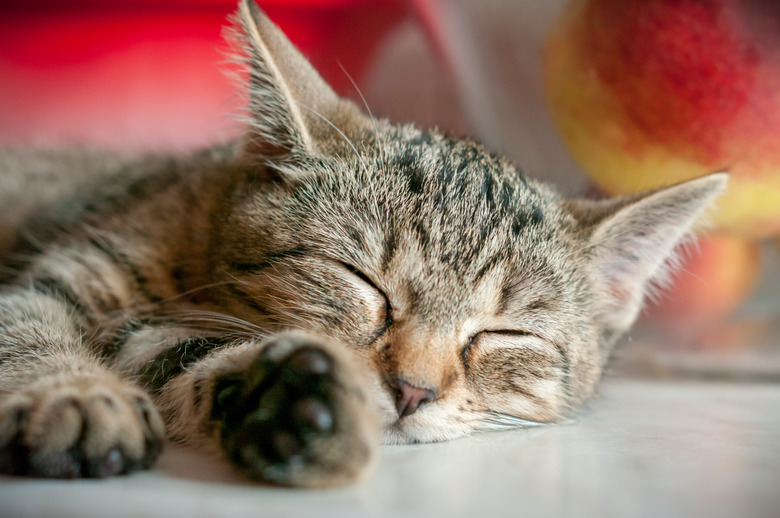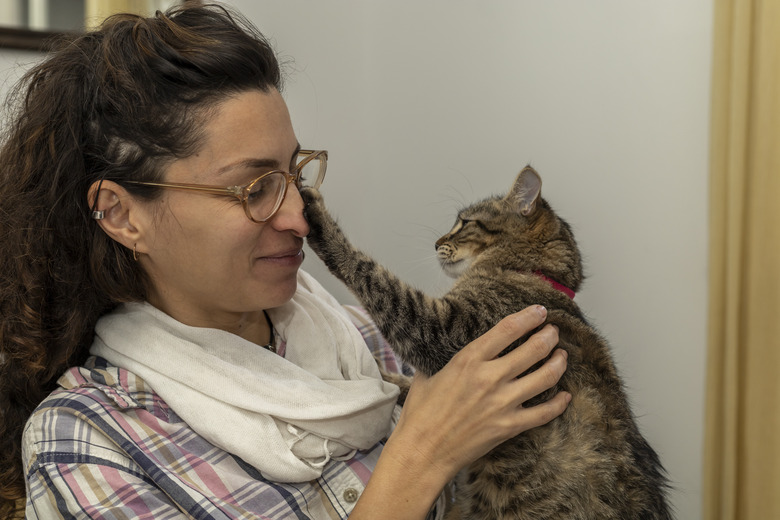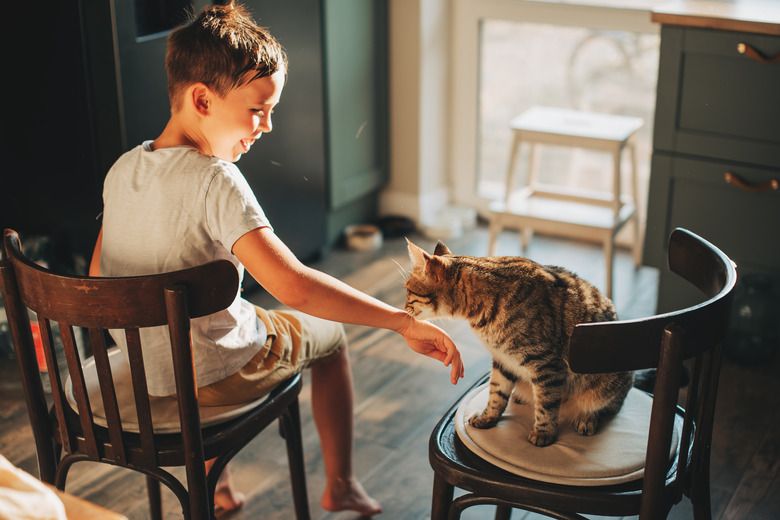Side Effects Of Anesthesia In Cats
As a loving cat owner, you naturally hope that your cat never needs surgery or another major procedure, but that won't always be the case. If your cat needs surgery, dental work, or a procedure like an MRI, your veterinarian may need to anesthetize them so that they don't feel pain and they stay still during the process.
While general anesthesia can cause some side effects in cats, you should familiarize yourself with what those side effects are, how your veterinarian can minimize them, and any risk factors your cat may have. With this information, you can better decide whether or not to proceed with the procedure.
Types of anesthesia for cats
Types of anesthesia for cats
Veterinarians use two types of anesthesia: injectable and inhalant. Injectable anesthesias are grouped into:
- Barbituates
- Dissociative anesthetics
- Nonbarbiturate hypnotics
Propofol, which is a nonbarbituate hypnotic, is often used for feline surgeries since it quickly takes effect, rarely has side effects, and pets recover quickly after its use. However, because the liver metabolizes Propofol, it shouldn't be used for cats who have severe liver disease.
In place of injectable anesthesia, veterinarians can also administer inhalant anesthesia by placing a mask over a cat's nose and mouth or by inserting a tracheal tube. Many veterinarians opt to use the inhalant anesthesia Isoflurane. Isoflurane is considered to be a very safe choice. Pets recover from it quickly, and veterinarians may use this anesthesia for pets who have heart problems.
Different types of anesthesia offer different benefits, and some may be better choices for pets who have preexisting health issues or risk factors. Your veterinarian will consider all of your cat's medical history and current health when determining the best type of anesthesia to use.
Anesthesia risk factors for cats
Anesthesia risk factors for cats
Any time a doctor gives a cat any sort of anesthetic agent, there are potential risks. This is true whether your cat is receiving short-term sedation for a quick procedure or a longer-term anesthesia for a multihour surgery. The good news is that anesthesia reactions are very rare, with just one in every 100,000 pets (including both cats and dogs) having a reaction.
Anesthesia reactions vary in both their type and severity. A reaction can be as minor as local site swelling or as life-threatening as anaphylactic shock. While the prospect of your cat having a bad reaction to anesthesia is frightening, it's important to remember that these reactions are rare, and your veterinarian and the veterinary hospital staff have an anesthetic protocol (meaning a system of using the medication) and can take steps to reduce the chance of your cat having a reaction.
Common anesthetic side effects in cats
Common anesthetic side effects in cats
Some of the most common side effects in cats include allergic reactions, which can be localized or systemwide. These reactions can result in swelling in your cat's body, which could affect their ability to breathe.
As cats wake up from anesthesia, it's possible for them to vomit. Because cats are still regaining control of their body, it's possible for them to breathe that food into their lungs, which could cause pneumonia. This is why your veterinarian will likely have you fast your cat before surgery.
Anesthesia can result in organ failure, which can happen in both cats with normal organ function and in cats whose organs were already functioning incorrectly. If a cat's blood pressure drops too low or if the pet gets too cold during surgery, the anesthesia can result in severe kidney damage too.
This is why most veterinarians these days provide intraoperative IV fluids during anesthetic procedures as well as having state of the art warming tables and blankets and IV fluid warmers to help keep internal body temperatures stable during procedures. In some cases, a cat with an undiagnosed heart condition can be stressed under anesthesia. This can result in cardiac arrest. Anesthesia can also trigger severe seizures. Remember, though, that serious reactions to anesthesia are rare.
Minimizing risk of anesthesia side effects in cats
Minimizing risk of anesthesia side effects in cats
These side effects are frightening, but proper care before, during, and after surgery can minimize the chance that your cat will experience any of these side effects. Before surgery, your veterinarian will perform bloodwork to assess your cat's kidney and liver function. Your veterinarian will assess these bloodwork results and analyze your cat's health and vital signs to make sure that they're healthy enough for the surgery.
During the surgery, your veterinarian will take and monitor your cat's temperature to ensure they don't get too cold. Other monitoring devices will track your cat's blood pressure, heart rate, respiratory rate, and oxygen rate so your veterinarian can immediately take steps to correct any problems that could arise before they have the chance to cause serious harm. Your veterinarian will place an IV catheter in your cat before surgery and will leave it in place throughout the procedure, which allows the veterinarian to quickly administer any medications your cat might need.
Veterinarians can also administer fluids through an IV catheter during the surgery, which can help to maintain a cat's blood pressure levels. By using the least amount of anesthesia needed to get the desired effect, the veterinarian can minimize the amount of anesthesia that a cat's body needs to process. Often, a veterinary technician will be assigned to monitor the cat constantly throughout the surgery. They will keep an eye on all of the machines and your cat's vital levels so that the surgical team can take immediate action to correct any potential issues.
Cat behavior after anesthesia
Cat behavior after anesthesia
As the anesthesia wears off, your cat will probably be groggy and tired. Some cats can have opposite reactions, though, and you may notice that your cat is restless after anesthesia. If you notice that your cat is hyperactive after anesthesia, they should be carefully monitored and confined to a safe space to prevent them from hurting themselves.
As your cat recovers, they may have a harder time controlling their body temperature, so you may notice they appear to be cold. Some cats appear to be disoriented or uncoordinated. Most of these effects should have worn off by the time that you pick up your cat from the veterinarian.
The types and severity of the side effects that you'll see will depend on the type of anesthesia used, the length of the procedure, and your cat's individual tolerance for the anesthesia.
Safe anesthesia recovery for cats
Safe anesthesia recovery for cats
To help your cat recover safely from anesthesia, follow your veterinarian's directions to a T. Your veterinarian will probably keep your cat for at least a few hours after surgery to observe their recovery. When it's time for your cat to be discharged, your veterinarian or a veterinary technician will provide you with some discharge paperwork and directions on how to care for your cat at home.
In most cases, your veterinarian will recommend that you keep your cat confined to a single room as they recover. There should be no other pets or animals in the room since your cat will probably be groggy and slow to react. Leave the cat carrier door open and allow your cat to stay in the carrier as long as they wish.
Your veterinarian may allow you to give your cat a small meal that evening, but you will need to monitor for any vomiting after your cat eats. The exact care that your cat needs will depend on the surgery that they've had and their individual health issues, so be sure to follow the specific directions that your veterinarian provides. If you have any questions or concerns about your cat's recovery after surgery, contact your veterinarian immediately.
The bottom line
The bottom line
If your cat needs surgery, dental work, or a procedure like an MRI, your veterinarian may need to anesthetize them so that they don't feel pain and can stay still during the process. Anesthesia reactions vary in both their type and severity. A reaction can be as minor as local site swelling or as serious as anaphylactic shock and death. These reactions are rare, and your veterinarian can take steps to reduce the chance of your cat having a reaction.


